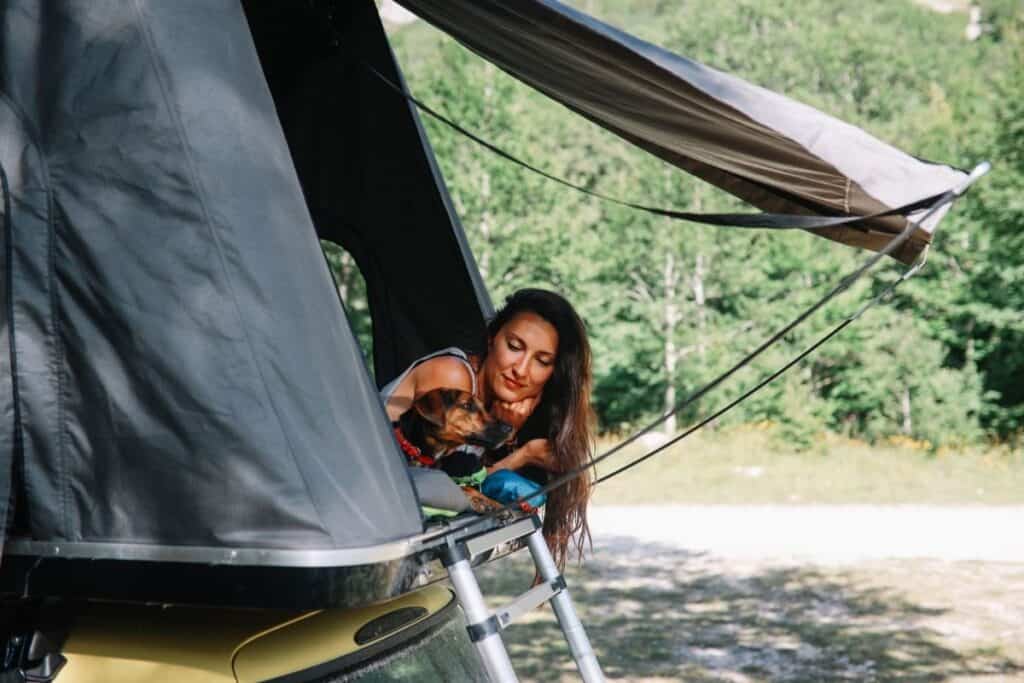
Rooftop tents have taken the camping world by storm since they came to the scene a few years ago, but are rooftop tents safe?
Typically, the rooftop tent has been used as a method to keep campers safe from snakes and other ground-dwelling critters that could potentially ruin your camping trip. Setting up an above-ground tent is meant to keep campers safe from the elements, but is the tent set up itself safe?
Rooftop tents are equally safe to ground-based tents given that they are appropriately sized and mounted to the vehicle and not overloaded with people or gear. Their raised elevation offers additional safety advantages from animals and water accumulation.
Rather than leaving it there, let’s break it down further!
Rooftop Tents—Are They Safe?
Putting a tent on the roof of your car may seem like a silly solution for avoiding dangerous animals while you are exploring their habitats, but it is a practical and convenient way to camp. But is it safe to have your camp set up on top of your car?
For the most part, yes, rooftop tents are safe, but many factors need to be considered when you’re looking for your perfect tent set up.
#1 Fall Risk
The biggest worry that campers have is about falling out of their rooftop tent. If you haven’t experienced this fear, it might seem irrational. But because most people think of soft-sided tents that flop over in the wind or rain, it’s a common concern.
The bottom line is that yes, it’s possible you could fall.
Realistically speaking, not only do most car-top tents have reinforced structures, but you’re also lying down in an enclosed area, not dancing on the open roof.
#2 Weather
Sleeping on top of your car gets you off the ground and away from potential flooding, snow pileup, and other weather elements. But it also positions you higher up, which could mean exposure to wind and rain (plus snow).
Ideally, you’ll park your vehicle somewhere with a bit of cover, the same way you would pitch a tent in a protected area.
At the same time, doing so could present another risk — tree damage. Depending on your environment and current conditions, ground-level camping could be safer in some instances.
#3 Equipment Failure
Equipment failure is another potential safety issue, but the truth is that most of these situations can be avoided with proper setup and maintenance of your roof top tent.
Always follow the manufacturer instructions, keep safety in mind (check out the tips below), and you’ll be just as safe as if you were sleeping on the ground.
Rooftop tents may involve safety risks, but they also offer a unique tent camping experience. Not to mention, they may keep you away from other hazards like animals or on-ground weather conditions.
Fortunately, there are some steps you can take to make your car tent camping experience safer.

Factors To Consider for Roof Tent Safety
Here are five main factors to consider to ensure tent safety:
1) What Car Are You Driving?
The size and type of tent you buy largely depends on your vehicle and what it would be able to carry. Hardshell tents are significantly heavier than the soft shell variety, and your car will need to accommodate the extra weight.
To find the max capacity of your car, you can check the owner’s manual, or the tire information placard in the driver’s side door.
Having the extra weight on the top of your car can also throw off the car’s center of gravity. This change in the gravity centre can increase the risk of accidents in smaller cars when driving on the highway.
The risk of throwing off your vehicle’s balance is not as prominent in larger cars or cars designed for off-roading as they have been built to withstand more weight than a smaller car.
2) What Size Tent Are You Looking For?
The size of your car also impacts the tent’s size that you’re able to use. A larger tent can not be adequately secured to a smaller roof without a secondary form of reinforcement.
It is essential to research the tents you’re interested in and the car you are driving so that you can choose the best and safest option for you.
3) What Kind of Racking Are You Using?
Your tent is attached to the racking on the roof of your car. As such, your tent can only be as secure as the racking it is connected to.
Standard racking that many cars come with are not optimized to withstand the weight of an empty rooftop tent, let alone one with sleeping campers in it.
You will need to install a new racking system that can handle the weight of your rooftop tent.
If the racking you’ve installed cannot handle the weight necessary for a rooftop tent with campers in it, the racking will break and can cause damage to your care.
Make sure you are doing your research before having your racking installed. Investing in the proper racking for your tent and car will save you money in the long run.
4) How Many People Will Be in the Tent?
As mentioned above, weight is an essential factor when deciding how to secure your tent. Just like a hard shell tent will weigh more than a softshell tent, a tent with four people will be heavier than a tent with two people in it.
If you know that you’ll be camping with a larger group of people, you will need a tent and the right racking to accommodate that weight.
5) What Is It Made Of?
In 2019, a recall was issued for the 2018 models of the Jeep Wranglers with rooftop tents due to a faulty part that was causing the tent covers to crack under high wind conditions.
The recall was issued after its drivers discovered that there was a risk that the cracked cover could fall off of the car while driving and cause accidents.
While this recall impacted only a few people, it is a prime example of the importance of making sure that you are using the right materials for your rooftop tent!
Tips and Tricks
So you’ve done all your research, you’re ready to take the plunge and purchase your new rooftop tent. Maybe you’ve already bought your new tent, or maybe you’re still on the fence about it. Here are some extra things you can do to help ensure the safety of your rooftop tent.
1) Test it out! Doing a test run in your tent before your trip can help ease your concerns. Set up your tent in the driveway and climb in. That way you can feel that your tent is safe and secure before you set out for your camping trip.
2) Bring extra reinforcements! It’s always better to be over prepared than underprepared, right? The same way you’d add some extra reinforcements for your tent on an especially windy day, you can add some extra safety precautions to your rooftop tent for your own peace of mind.
3) Ask for advice! Never be afraid to ask for help. Whether you have some friends that are into camping, or you know a great online forum where you can ask for advice, there is help out there for you.
If you have any questions about your car and installing new racking, you can always talk to your local mechanics to help you decide what tents and racking are best suited for your car.
In Conclusion: Are Roof Top Tents Safe?
Simply put, yes, the roof top tent is a safe alternative to on-ground camping.
As long as you have made sure to do the research and understand what your car can handle, and properly secure your tent to the roof of your car, you will not run into any issues. Happy camping!
Related Posts
If you found this article helpful, then make sure to take a look at these other posts before you go!
